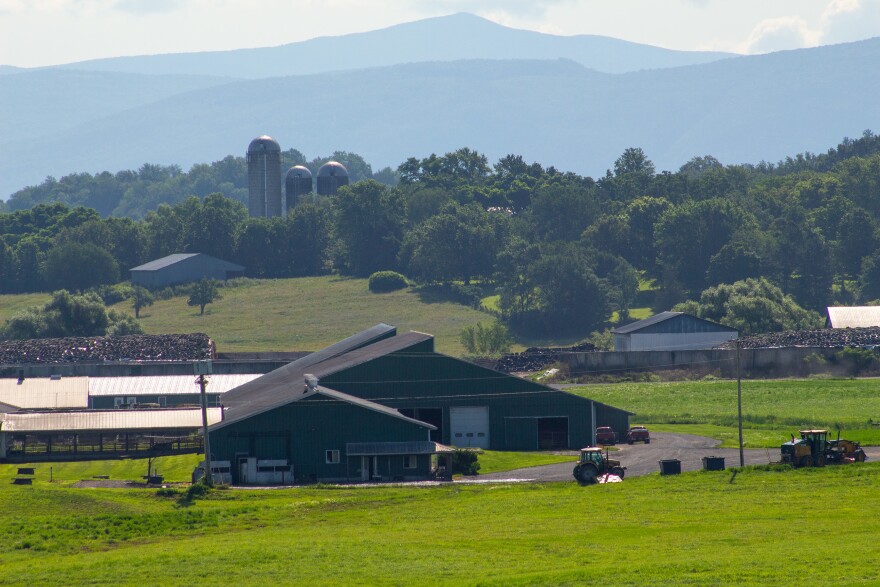Around two in the morning on Jan. 28, 2023, Vermont State Police responded to a dairy farm in Addison. According to a written report, police received a call about a farm owner allegedly assaulting a farmworker and some visitors while they were dropping off supplies.
Puedes leer la versión en español, aquí.
This incident would eventually lead to the farmworker in question getting fired.
In body camera footage from Trooper Brandon Slaney, the farm owner tells the officer that visitors were at the barn, where he’d asked them not to be.
“So I'm coming down here about quarter of one to start feeding cows,” he tells Slaney. “I see a vehicle, so I went back around, and one of them’s that’s supposed to be milking is outside. I said, ‘You’re supposed to be milking.’ I said, ‘You get in the barn.’ I said, ‘You get in the f—ing barn.’”
Slaney then asks whether the farmworker is OK.
“They just saw you grab somebody, and they were trying to call to make sure that he was safe,” Slaney says.
The farm owner responds: “Like basically these guys, man – we’re probably one of the only farms, one of the farms around here that treat these guys excellent.”
But the body camera footage provided by Vermont State Police shows no officer sought an interview with the farmworker.
(Vermont Public reached out to Vermont State Police about this incident. In response, their Fair and Impartial Policing and Community Affairs department reviewed the case, and said while no additional intervention from law enforcement was needed, it raised questions about how easily officers can access translation services.)

Miguel Mejía says he was the farmworker at the center of this police report, and that the farm owner was Andre Dubois.
Mejía spoke with Vermont Public through an interpreter earlier this year, and he says three days after his boss pulled him around, he got fired.
“Well, the boss kicked me out,” Mejía said. “The police arrived, and he said it was my fault that the cops came. But, I don't even speak English, so how am I going to call the cops?”
Mejía lost not only his income but his housing, too, and ended up moving out of state for a new job.
He said he had liked working with family members and milking cows in Vermont, but this experience made him feel bad.
Vermont Public contacted Andre Dubois. He did not want to discuss the incident, but did confirm Mejía was an employee at the farm.
Workplace risks for immigrant dairy farmworkers
Assault is one egregious example of an unsafe workplace. But workers and advocates say — and documents reviewed by Vermont Public show — it's not uncommon for Vermont immigrant dairy farmworkers to experience unfair and unsafe working conditions.
One worker told Vermont Public he lost a toe after having to drive a malfunctioning skid steer that trapped his foot between its bucket and front tire. The pain, he said, felt like “my body was leaving through my foot.”
A 2021 paper published by University of Vermont researchers shows that while dairy is already one of the most dangerous sectors in agriculture — due to working with large animals and machinery, as well as toxic chemicals — Latino immigrant farmworkers are especially at risk.
Most immigrant dairy farmworkers don’t speak English, which the paper says can make it harder to receive adequate safety training. Many of these farmworkers are also thought to be undocumented, and fear of deportation can prevent them from seeking health care or speaking up.
So, many immigrant dairy farmworkers do not stay at their jobs for long.
What recourse is (or isn’t) available
After losing his job at the Dubois farm, Mejía did try to take action. He reached out to the advocacy organization Migrant Justice, who contacted Vermont Public to share his story.
Together, Mejía and Migrant Justice filed a complaint through the “Speak Up Line” offered by Ahold Delhaize, the parent company of Hannaford Supermarkets. The hotline is available to workers in their supply chain.
Records provided to Vermont Public show Hannaford responded a little under two months later, saying they did an investigation at Dubois Farm and issued a formal warning to their supplier. They added that “there is no place for any type of violent behavior in the workplace.”
Hannaford did not provide assistance to Mejía.

Migrant Justice organizer Marita Canedo also called state police, and she said they told her there was nothing more they could do.
Canedo planned to help Mejía file a complaint with the Vermont Department of Labor – all workers, regardless of immigration status, have the right to file both state and federal labor complaints. But she lost touch with Mejía when he moved out of state for new work.
“The reality is that people keep on going with their lives,” she said. “And they don't trust that – you know, like a lengthy process and investigation. I mean, they are not going to get their jobs back.”
A records request by Vermont Public shows not many farmworkers use the state’s labor complaint system. In the past five years, the Vermont Department of Labor has investigated only one dairy farm following a complaint by an immigrant dairy farmworker.
The worker alleged he was fired after getting sick from using formaldehyde for cow foot baths and not being provided protective equipment. The investigation took about five months to resolve, and records show none of the abatements required for the farm made any amends to the worker in question.
Milk With Dignity
Of course, there are some situations where no reparations can make up for what happened. In 2009, an immigrant dairy farmworker in Vermont died on the job. That’s when Migrant Justice says it began to organize, and it eventually built the grassroots farmworkers’ rights program Milk With Dignity.
Under the program, corporations pay farms a premium to follow labor and housing standards.
Milk With Dignity has a particularly effective worker hotline compared to corporate complaint lines. That’s according to University of Virginia researchers Kathryn Babineau and Maya Stephens, who wrote up their results in the Harvard Business Review.
In addition to being available in Spanish 24/7, Babineau says the hotline is accessible with WhatsApp, which makes it easier to use for farmworkers in rural areas.
“Places where cell service might not be particularly good … but WiFi generally is good,” Babineau said.
In two and a half years, 260 immigrant dairy farmworkers made 460 calls. The average time between a call and an investigation was a day – and between a call and full resolution, five days.
Maya Stephens says it also helps that not every complaint requires a formal process.
“The workers can just text in a complaint, and you can just call up, you know, different farm managers and such,” Stephens said. ”And that informality that also kind of goes into the context of a dairy farm, and the culture and the structure of it's already in place.”
The researchers say another important component is Milk With Dignity’s enforcement mechanism. Farm employers risk losing their milk supply contract if they retaliate against workers or take no action at all.
But so far, Ben & Jerry’s is still the only corporation to have signed on to Milk With Dignity, which covers 20% of Vermont’s dairy production.
Migrant Justice says it wants more companies to join. In particular, the organization has been heavily advocating for Hannaford Supermarkets to sign on, because, advocates say, it is one of the main buyers of dairy from Vermont.

In a written statement from June, Hannaford said while it supports the “fair, safe and humane treatment of agricultural workers,” it doesn’t believe signing an agreement with Milk With Dignity is the way to do it. The company said that lasting change would happen at scale across the food industry, and in partnership with “credible, external auditing organizations.”
To that end, Hannaford said it has already partnered with several national dairy organizations and is onboarding an independent, third-party auditor to ensure the well-being and dignity of farmworkers.
There are others who think lobbying corporations to join Milk With Dignity is not the most effective approach. Vermont Retail & Grocers Association President Erin Sigrist says workers’ rights should be the purview of state officials, not the industry.
“I would strongly encourage that they work with elected officials to address the issues and concerns that they have, not showing up to retail stores and making employees or customers uncomfortable,” Sigrist said.
Unexpected benefits
Migrant Justice organizers agree that they should also work with the Vermont Labor Department and the Vermont Legislature. This year, the organization testified in favor of allowing agricultural workers to unionize and for good cause termination, which creates a higher bar for employers to fire employees.
But Migrant Justice also says it sees uneven enforcement of existing laws, which is why advocates are asking corporations to partner with farmworkers to protect their rights.
And University of Virginia researcher Kathryn Babineau says what she and her co-author found is that employers engaging with their employees can have unexpected benefits.
“There may be some more opportunities for collaborative problem-solving than we often sort of see painted out,” Babineau said.
The research on Milk With Dignity, for instance, shows the program can improve conditions not only for farmworkers but for their employers, and by extension, the industry at large. This is mainly because workers under the program stay at their jobs longer.

Jose Luis Cordova says it’s because of Milk With Dignity that he’s stuck around at Gervais Farm in Enosburg Falls for five years — long enough to get some chickens and plant a garden.
Before working and living here, he says he would never last too long at other Vermont dairy farms.
“Since the conditions are so bad, one can stand it, I don't know, for a maximum of a year, six months, two months, depending on how the problem is at the farms, right?” Cordova said.
The difference now, he says, is that he knows his rights as a worker, and he knows there’s a program in place to protect them.
“You have confidence, you have more freedom to express yourself, more freedom to have the confidence to go out, to express yourself, to ask for things,” he said.
Cordova says in this job, under these conditions, he’s comfortable — he feels good. And he doesn’t have any plans to leave.
You can find a Spanish version of this story here, which we produced in partnership with New Hampshire Public Radio.
Have questions, comments or tips? Send us a message.
Enter your email to sign up for The Frequency
Vermont Public's daily news update, sent weekday mornings.




